(新课标)Unit 5 What are the shirts made of.SectionA Section A2d-Grammar Focus 公开课课件
文档属性
| 名称 | (新课标)Unit 5 What are the shirts made of.SectionA Section A2d-Grammar Focus 公开课课件 | 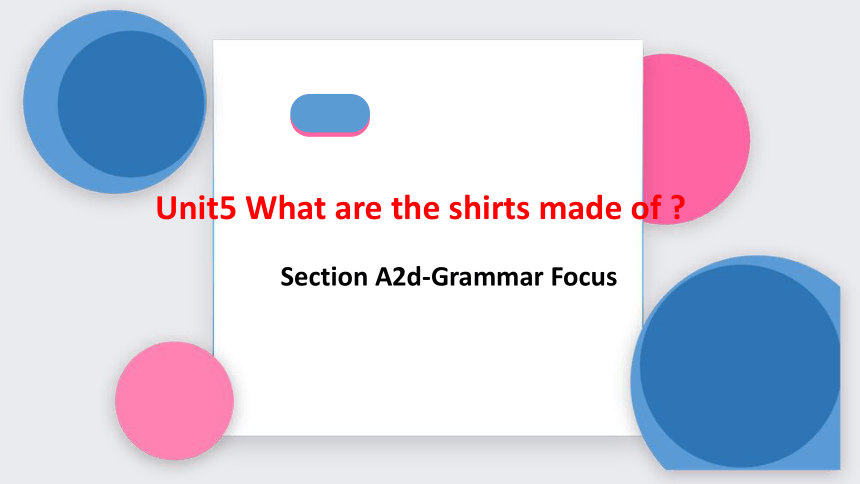 | |
| 格式 | pptx | ||
| 文件大小 | 2.7MB | ||
| 资源类型 | 试卷 | ||
| 版本资源 | 人教新目标(Go for it)版 | ||
| 科目 | 英语 | ||
| 更新时间 | 2023-10-07 08:43:16 | ||
图片预览

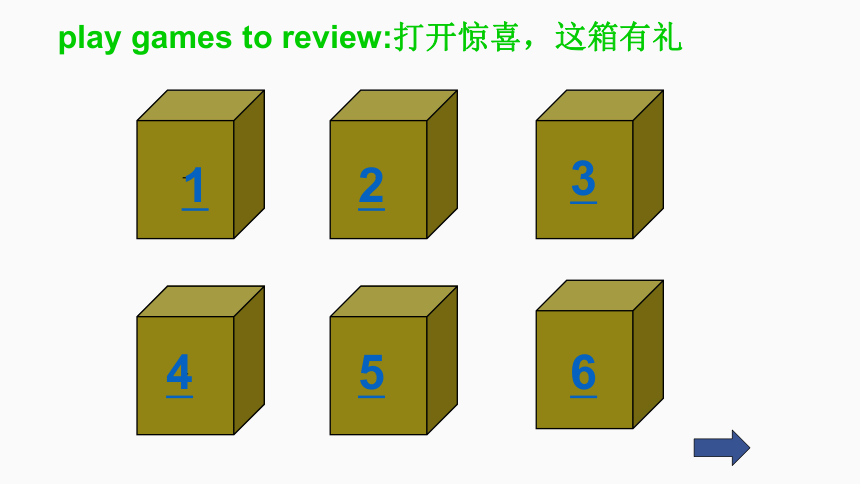
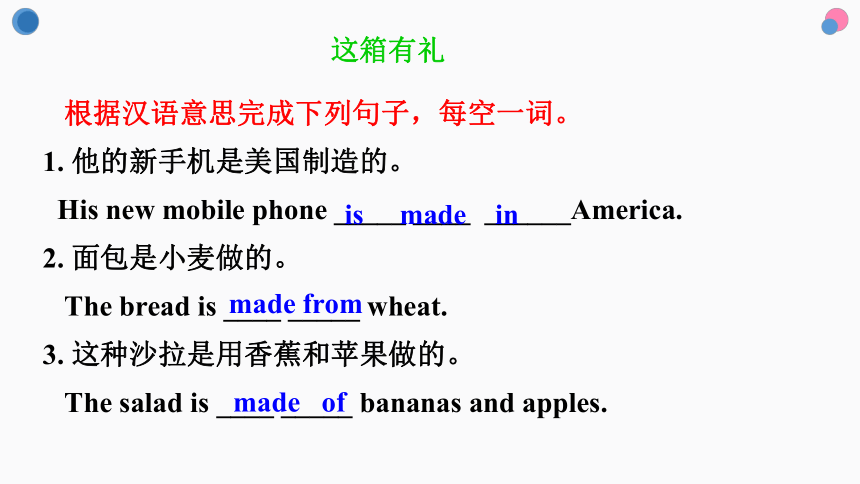
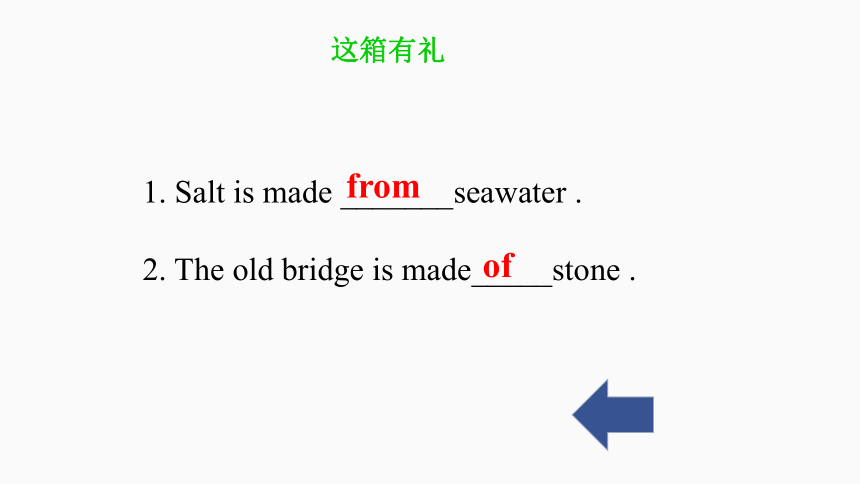
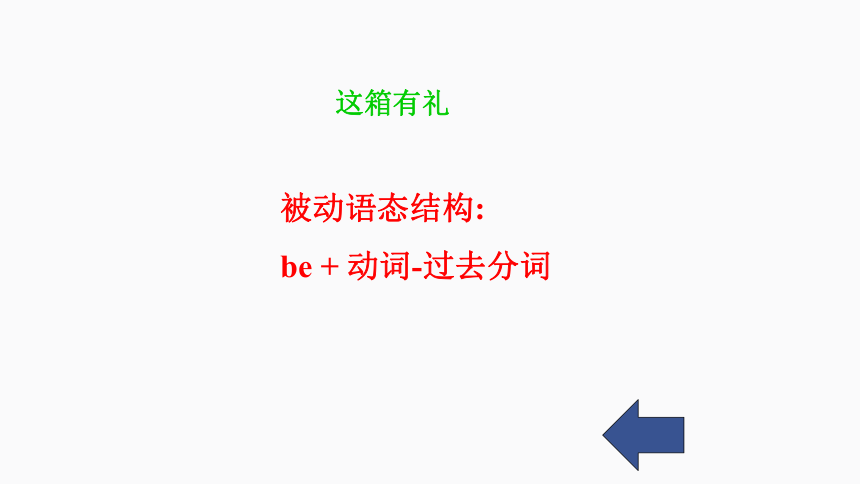
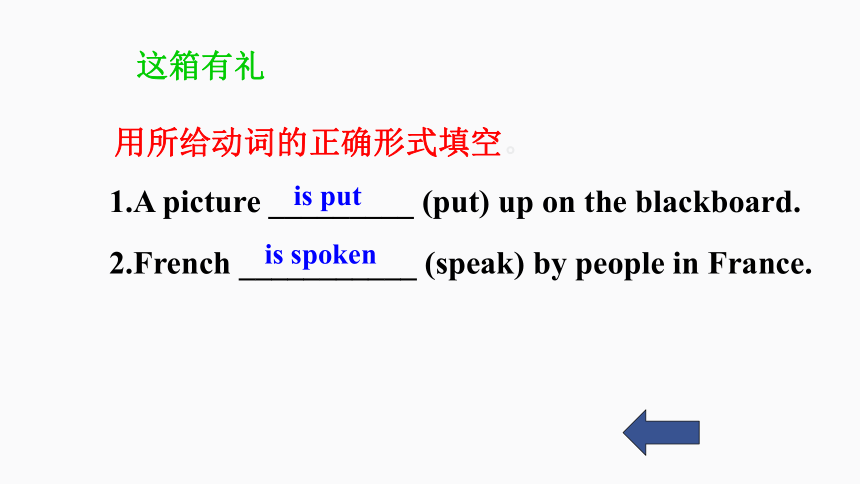
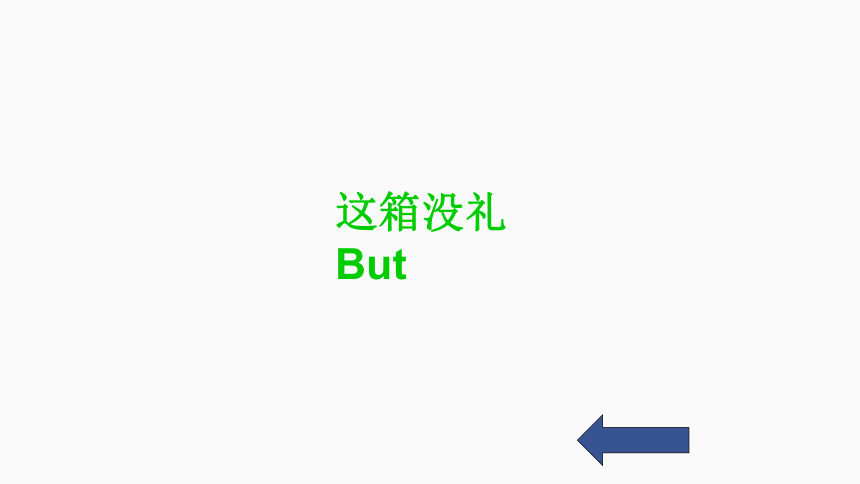
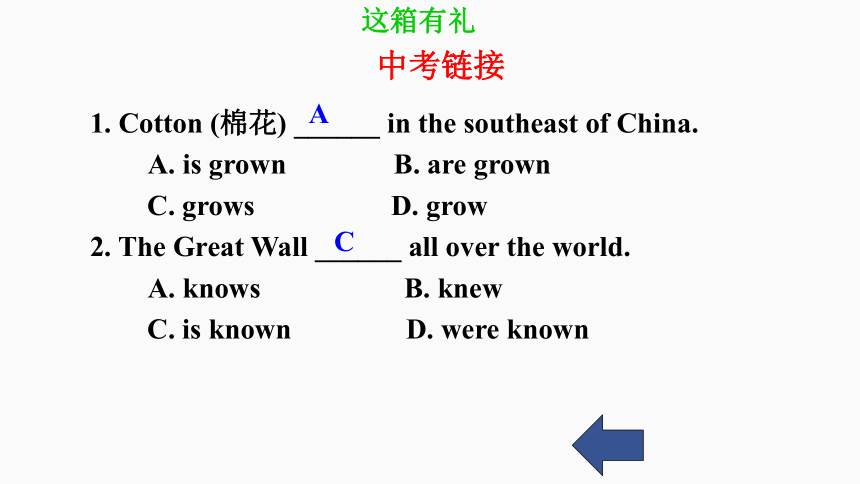
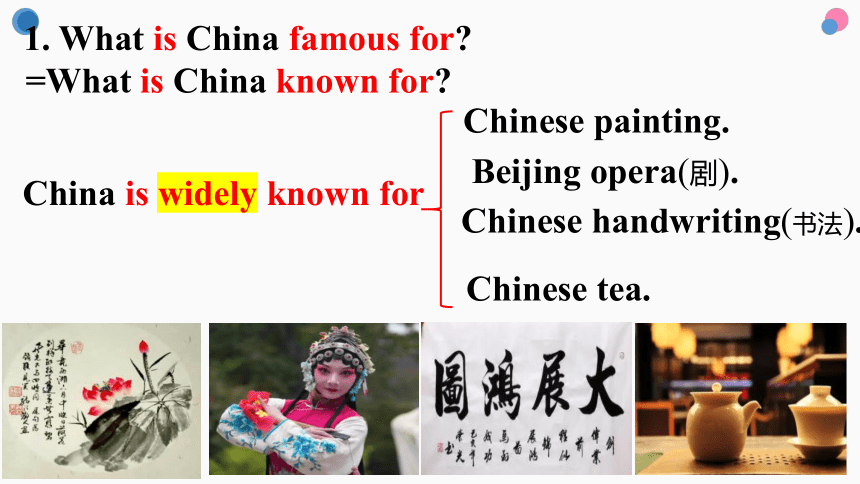
文档简介
(共24张PPT)
Unit5 What are the shirts made of
Section A2d-Grammar Focus
1
2
3
4
5
6
play games to review:打开惊喜,这箱有礼
这箱有礼
根据汉语意思完成下列句子,每空一词。
1. 他的新手机是美国制造的。
His new mobile phone _____ ____ ______America.
2. 面包是小麦做的。
The bread is ____ _____ wheat.
3. 这种沙拉是用香蕉和苹果做的。
The salad is ____ _____ bananas and apples.
is made in
made from
made of
这箱有礼
1. Salt is made _______seawater .
2. The old bridge is made_____stone .
of
from
被动语态结构:
be + 动词-过去分词
这箱有礼
1.A picture _________ (put) up on the blackboard.
2.French ___________ (speak) by people in France.
is put
is spoken
用所给动词的正确形式填空。
这箱有礼
这箱没礼
But
1. Cotton (棉花) ______ in the southeast of China.
A. is grown B. are grown
C. grows D. grow
2. The Great Wall ______ all over the world.
A. knows B. knew
C. is known D. were known
A
中考链接
C
这箱有礼
1. What is China famous for
=What is China known for
China is widely known for
Chinese painting.
Beijing opera(剧).
Chinese handwriting(书法).
Chinese tea.
1. What kind of Chinese tea is it
绿茶
红茶
黑茶
乌龙茶
黄茶
白茶
green tea
black tea
dark tea
oolong tea
yellow tea
white tea
What are they doing
How much do you know about tea
They are p_______ the leaves of tea.
icking
1. Which country is famous for tea
China is famous for tea.
2. Where is tea produced in China
It is produced in many different areas.
For example, Anxi and Hangzhou are widely known for their tea.
Read 2d and answer the questions.
Tea plants ____________
Tea leaves ________________
Then tea leaves ___________________
The tea__________
Finally the tea _________ many countries and places around China.
are grown
are picked by hand.
are sent for processing.
is packed
is sent to
are grown被种植 are picked被摘
are sent被送去 is packed被包装
3. How is tea produced
4. Why do so many peeople like drinking tea
People say that tea is good for both health and business.
Pam: China is famous for tea, right
Liu Jun: Yes, both in the past and now.
Pam: Where is tea produced in China
Liu Jun: Well, in many different areas. For example, Anxi and
Hangzhou are widely known for their tea.
Pam: How is tea produced
Liu Jun: Well, as far as I know, tea plants are grown on the sides of mountains.
When the leaves are ready, they are picked by hand and then
are sent for processing.
再读,完成下列的短语填空
以...著名
茶在哪里被生产
因...众所周知
据我所知
被种植
在山坡上
被摘
用手,亲手
被送去加工
同义词:be known for因…而闻名
be famous /known as
作为…而闻名
Pam: What happens next
Liu Jun: The tea is packed and sent to many
different countries and places around
China.
Pam: It seems that many people all over the world drink
Chinese tea.
Liu Jun: Yes, people say that tea is good for both health and
business!
被包装
被送到
似乎,看来好像
世界各地
对..有好处
It seems that+从句 …似乎.../看来好像,表示说话人的主观判断
Pam:China is famous for tea,right
Liu Jun:Yes,both in the past and now.
Pam:Where is tea produced in China
Liu Jun:Well,in many different areas. For example,
Anxi and Hangzhou are widely known for their tea.
Pam:How is tea produced
Liu Jun: Well,as far as I know, tea plants are grown on the sides of mountains.
When the leaves are ready, they are picked by hand and then are sent for processing.
Pam:What happens next
Liu Jun: The tea is packed and sent to many different countries and places around
China.
Pam:It seems that many people all over the world drink Chinese tea.
Liu Jun:Yes,people say that tea is good for both health and business!
2d
被动语态一般现在时的基本结构为:am/is/are+及物动词的-ed形式。
英语中有两种语态,说明主语与谓语动词的关系,分主动语态 与被动语态。主动语态表示主语是动作的执行者;被动语态表示主语是动作的承受者.
被动语态:
1.构成:be+动词过去分词(be有各种时态的变化)
2.被动句: 主语 + be + 动词过去分词 +( by + 宾语)。
(如要说明动作发出者就加上by+sb(被某人/由某人)
主动句: 主语 + 及物动词 + 宾语 +其他。
被动句: 主语 + be + 动词过去分词 + ( by + 宾语 )+其他
Most people speak English in the world.
English is spoken by most people in the world.
口诀:原宾变现主谓语变被动加之by引导
动词过去分词的变化与动词过去式相同,除特殊外
1.规则动词的过去分词:
1)一般情况在动词原形后加-ed
watch---watched
2)以不发音e结尾的加-d
practice---practiced
3)以辅音加y结尾的,去y变i加-ed
study---studied
4)以重读闭音节结尾,末尾只有一个辅音字母,先双写该
辅音字母,再加-ed
stop---stopped
drop---dropped
主动变被动解题步骤:
1. 找宾语 ----即动作的承受者
2. 判断新主语的单复数 ----即be动词的单复数
3. 根据原动词的时态 ----即be动词的时态
4. 修改谓语的时态 ----即原句动词改为过去分词
5. 原句主语 后移 变为by+宾格/名词
They make shoes in that factory.
Shoes
are
were
made
by them in that factory.
Rewrite the sentences using the passive voice.
4b
Farmers plant the tea on the sides of mountains.
_____________________________________________
2. This shop uses the best materials to make dresses.
_____________________________________________
3. Careless driving causes many traffic accidents.
_____________________________________________
4. The postman brings letters and postcards to people’s homes.
_____________________________________________
5. Our family does not use this silver plate very often.
_____________________________________________
The tea is planted on the sides of mountains by farmers.
The best materials are used to make dresses by this shop.
Many traffic accidents are caused by careless driving.
Letters and postcards are brought to people’s homes.
This silver plate is not used very often in our family.
引起许多交通事故
Are your shirts made of cotton 你的衬衫是由棉做成的吗?
Yes, they are. And they were made in the US.
是的,他们是在美国制造。
What’s the model plane made of 这模型飞机是由什么制造的? It’s made of used wood and glass.
它是由用过的木头和草制作的
Where is tea produced in China It’s produced in many different areas.
How is tea produced Tea plants are grown on the sides of mountains. When the leaves are ready, they are picked by hand and then are sent for processing.
Grammar Focus
被动语态一般疑问句:be+主语+过去分词+其他?
被动语态特殊疑问句:
特殊疑问词+be+主语+过去分词+其他?
否定句:主语+be not+动词过去分词+其他
homework:4a
1. Children under 18 _______________ (not allowed) to watch this show without their parents.
2. We _________ (pay) by the boss on the last Friday of each month.
3. A: What language ___________ (speak) in Germany
B: Most people speak German, but many can speak English, too.
4. Most of the earth’s surface __________ (cover) by water.
5. The classroom needs to _________ (clean) every day.
are not allowed
are paid
is spoken
is covered
be cleaned
boss n. 老板; 上司
Germany n. 德国
surface n. 表面; 表层
Thank you for listening!
Unit5 What are the shirts made of
Section A2d-Grammar Focus
1
2
3
4
5
6
play games to review:打开惊喜,这箱有礼
这箱有礼
根据汉语意思完成下列句子,每空一词。
1. 他的新手机是美国制造的。
His new mobile phone _____ ____ ______America.
2. 面包是小麦做的。
The bread is ____ _____ wheat.
3. 这种沙拉是用香蕉和苹果做的。
The salad is ____ _____ bananas and apples.
is made in
made from
made of
这箱有礼
1. Salt is made _______seawater .
2. The old bridge is made_____stone .
of
from
被动语态结构:
be + 动词-过去分词
这箱有礼
1.A picture _________ (put) up on the blackboard.
2.French ___________ (speak) by people in France.
is put
is spoken
用所给动词的正确形式填空。
这箱有礼
这箱没礼
But
1. Cotton (棉花) ______ in the southeast of China.
A. is grown B. are grown
C. grows D. grow
2. The Great Wall ______ all over the world.
A. knows B. knew
C. is known D. were known
A
中考链接
C
这箱有礼
1. What is China famous for
=What is China known for
China is widely known for
Chinese painting.
Beijing opera(剧).
Chinese handwriting(书法).
Chinese tea.
1. What kind of Chinese tea is it
绿茶
红茶
黑茶
乌龙茶
黄茶
白茶
green tea
black tea
dark tea
oolong tea
yellow tea
white tea
What are they doing
How much do you know about tea
They are p_______ the leaves of tea.
icking
1. Which country is famous for tea
China is famous for tea.
2. Where is tea produced in China
It is produced in many different areas.
For example, Anxi and Hangzhou are widely known for their tea.
Read 2d and answer the questions.
Tea plants ____________
Tea leaves ________________
Then tea leaves ___________________
The tea__________
Finally the tea _________ many countries and places around China.
are grown
are picked by hand.
are sent for processing.
is packed
is sent to
are grown被种植 are picked被摘
are sent被送去 is packed被包装
3. How is tea produced
4. Why do so many peeople like drinking tea
People say that tea is good for both health and business.
Pam: China is famous for tea, right
Liu Jun: Yes, both in the past and now.
Pam: Where is tea produced in China
Liu Jun: Well, in many different areas. For example, Anxi and
Hangzhou are widely known for their tea.
Pam: How is tea produced
Liu Jun: Well, as far as I know, tea plants are grown on the sides of mountains.
When the leaves are ready, they are picked by hand and then
are sent for processing.
再读,完成下列的短语填空
以...著名
茶在哪里被生产
因...众所周知
据我所知
被种植
在山坡上
被摘
用手,亲手
被送去加工
同义词:be known for因…而闻名
be famous /known as
作为…而闻名
Pam: What happens next
Liu Jun: The tea is packed and sent to many
different countries and places around
China.
Pam: It seems that many people all over the world drink
Chinese tea.
Liu Jun: Yes, people say that tea is good for both health and
business!
被包装
被送到
似乎,看来好像
世界各地
对..有好处
It seems that+从句 …似乎.../看来好像,表示说话人的主观判断
Pam:China is famous for tea,right
Liu Jun:Yes,both in the past and now.
Pam:Where is tea produced in China
Liu Jun:Well,in many different areas. For example,
Anxi and Hangzhou are widely known for their tea.
Pam:How is tea produced
Liu Jun: Well,as far as I know, tea plants are grown on the sides of mountains.
When the leaves are ready, they are picked by hand and then are sent for processing.
Pam:What happens next
Liu Jun: The tea is packed and sent to many different countries and places around
China.
Pam:It seems that many people all over the world drink Chinese tea.
Liu Jun:Yes,people say that tea is good for both health and business!
2d
被动语态一般现在时的基本结构为:am/is/are+及物动词的-ed形式。
英语中有两种语态,说明主语与谓语动词的关系,分主动语态 与被动语态。主动语态表示主语是动作的执行者;被动语态表示主语是动作的承受者.
被动语态:
1.构成:be+动词过去分词(be有各种时态的变化)
2.被动句: 主语 + be + 动词过去分词 +( by + 宾语)。
(如要说明动作发出者就加上by+sb(被某人/由某人)
主动句: 主语 + 及物动词 + 宾语 +其他。
被动句: 主语 + be + 动词过去分词 + ( by + 宾语 )+其他
Most people speak English in the world.
English is spoken by most people in the world.
口诀:原宾变现主谓语变被动加之by引导
动词过去分词的变化与动词过去式相同,除特殊外
1.规则动词的过去分词:
1)一般情况在动词原形后加-ed
watch---watched
2)以不发音e结尾的加-d
practice---practiced
3)以辅音加y结尾的,去y变i加-ed
study---studied
4)以重读闭音节结尾,末尾只有一个辅音字母,先双写该
辅音字母,再加-ed
stop---stopped
drop---dropped
主动变被动解题步骤:
1. 找宾语 ----即动作的承受者
2. 判断新主语的单复数 ----即be动词的单复数
3. 根据原动词的时态 ----即be动词的时态
4. 修改谓语的时态 ----即原句动词改为过去分词
5. 原句主语 后移 变为by+宾格/名词
They make shoes in that factory.
Shoes
are
were
made
by them in that factory.
Rewrite the sentences using the passive voice.
4b
Farmers plant the tea on the sides of mountains.
_____________________________________________
2. This shop uses the best materials to make dresses.
_____________________________________________
3. Careless driving causes many traffic accidents.
_____________________________________________
4. The postman brings letters and postcards to people’s homes.
_____________________________________________
5. Our family does not use this silver plate very often.
_____________________________________________
The tea is planted on the sides of mountains by farmers.
The best materials are used to make dresses by this shop.
Many traffic accidents are caused by careless driving.
Letters and postcards are brought to people’s homes.
This silver plate is not used very often in our family.
引起许多交通事故
Are your shirts made of cotton 你的衬衫是由棉做成的吗?
Yes, they are. And they were made in the US.
是的,他们是在美国制造。
What’s the model plane made of 这模型飞机是由什么制造的? It’s made of used wood and glass.
它是由用过的木头和草制作的
Where is tea produced in China It’s produced in many different areas.
How is tea produced Tea plants are grown on the sides of mountains. When the leaves are ready, they are picked by hand and then are sent for processing.
Grammar Focus
被动语态一般疑问句:be+主语+过去分词+其他?
被动语态特殊疑问句:
特殊疑问词+be+主语+过去分词+其他?
否定句:主语+be not+动词过去分词+其他
homework:4a
1. Children under 18 _______________ (not allowed) to watch this show without their parents.
2. We _________ (pay) by the boss on the last Friday of each month.
3. A: What language ___________ (speak) in Germany
B: Most people speak German, but many can speak English, too.
4. Most of the earth’s surface __________ (cover) by water.
5. The classroom needs to _________ (clean) every day.
are not allowed
are paid
is spoken
is covered
be cleaned
boss n. 老板; 上司
Germany n. 德国
surface n. 表面; 表层
Thank you for listening!
同课章节目录
- Unit 1 How can we become good learners.
- Section A
- Section B
- Unit 2 I think that mooncakes are delicious!
- Section A
- Section B
- Unit 3 Could you please tell me where the restroom
- Section A
- Section B
- Unit 4 I used to be afraid of the dark.
- Section A
- Section B
- Unit 5 What are the shirts made of?
- Section A
- Section B
- Review of Units 1-5
- Unit 6 When was it invented?
- Section A
- Section B
- Unit 7 Teenagers should be allowed to choose their
- Section A
- Section B
- Unit 8 It must belong to Carla.
- Section A
- Section B
- Unit 9 I like music that I can dance to.
- Section A
- Section B
- Unit 10 You're supposed to shake hands.
- Section A
- Section B
- Review of Units 6-10
- Unit 11 Sad movies make me cry.
- Section A
- Section B
- Unit 12 Life is full of the unexpected
- Section A
- Section B
- Unit 13 We're trying to save the earth!
- Section A
- Section B
- Unit 14 I remember meeting all of you in Grade 7.
- Section A
- Section B
- Review of Units 11-14
